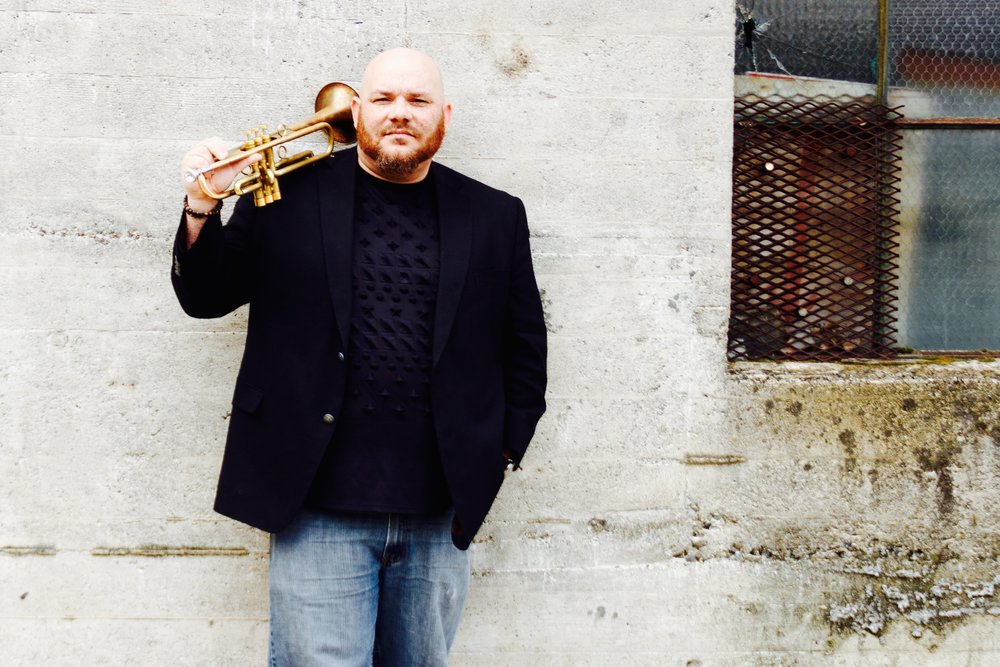
Trumpeter. Family man. Teacher. These are only a few words that describe Marmoset artist and Marmoset A&R team member extraordinaire, Farnell Newton, who has spent the last 17 years building a community within the Portland jazz scene and beyond. As a frequent collaborator with musicians all over the world, a former jazz professor at Portland State University, founder of Jam of the Week and a past touring member with the likes of Jill Scott, Bootsy Collins and Liv Warfield (not to mention that one time he played with Stevie Wonder… no big deal), Farnell’s experience at this point knows no bounds — and for him, it all comes down to community and collaboration.
We chatted with Farnell about his latest album, Back to Earth, his guiding principle when curating music at Marmoset and the closest thing to real magic.
Marmoset: Why the trumpet?
Farnell Newton: My first instrument was trombone. My arm wasn’t long enough to get the 7th position — which, now I know from other professional musicians in the world, that lots of people can’t reach that 7th position. So I switched from trombone to French Horn and I played French Horn for a couple years, but then I really was drawn to the trumpet, probably because it fit my character more. I would look to the back of the band and see them back there kind of always up to something, so I made the switch.
Can you tell us about your new album, Back to Earth, in five words or less?
Acoustic. Jazz. Community. Conscious. Spiritual. Five words. Whew.
What is the closest thing to real magic?
You know what, the closest thing to real magic for me is being with my kids. That’s whimsical but also magical and adventurous and loving all at once.
What classic Disney villain would you want to have their own origin story?
Iago from Aladdin. Because he was pretty bad in the first one and then in the next one he was good. Maybe him and Cruella de Vil. I would love to see her backstory because she is just a mess. How did she get to that point? Wow.
What does successful collaboration look like to you?
I feel like the goal is to really just make the best music we can together by adding our own character and personality to the music. It can kinda turn out any kind of way and it can be almost any kind of genre, but I feel like if it captures the personalities and characters and our love of music, then it would be good. And I’ve collaborated with different people in person, on the Internet, and it’s always good to get other people’s way of how they create music, because we all have different processes of creating music. I always love to do that because you get to see what other people do. Some of it might be something you could take and use for your own creative measures and things and making music later on.
You’ve had such an outstanding career, touring with greats like Bootsy Collins, Jill Scott, Cee Lo Green. You taught jazz at PSU and have a youth jazz group. Is there anything left that you have to do? What’s next?
Just keep working with great musicians. I’ve lived so many different lives and I feel like just creating music with other up and coming artists who are great. My bucket list is not really that long anymore. I’m always down to collaborate, that’s my thing. I tell people to contact me , and I just feel like I’m always up to find where’s the next adventure? I’m always just working with youth, I have a thing I’m doing now where I might be on the board of a youth organization for jazz artists and different things. I just try to engulf myself in music.
What is your guiding principle when curating music for Marmoset?
For me, it depends on the project and what kind of story that needs to be told through the music. Is it a project that calls for happy music, sad music, dramatic music? Does it call for orchestral music that feels sorrowful, upbeat Latin groove that oozes with romance, or a jazzy waltz that has a sentimental feeling of love and trust? You tell me a story and I’ll give you the music.
What is something you wish all artists new about music licensing?
I wish all musicians knew how to get their music to a licensing company like Marmoset. Music licensing should be a class taught in schools or as a part of a career learning program for musicians. Those workshops could cover everything from learning how to write for ad placements, contacting music licensing companies, registering your music with a PRO (Performing Rights Organization like ASCAP, BMI, or Sesac), and so much more.
What about all filmmakers?
That the music is as important as the film itself. Plan on having a budget so that you can have the right music to help your film footage tell a great story.
